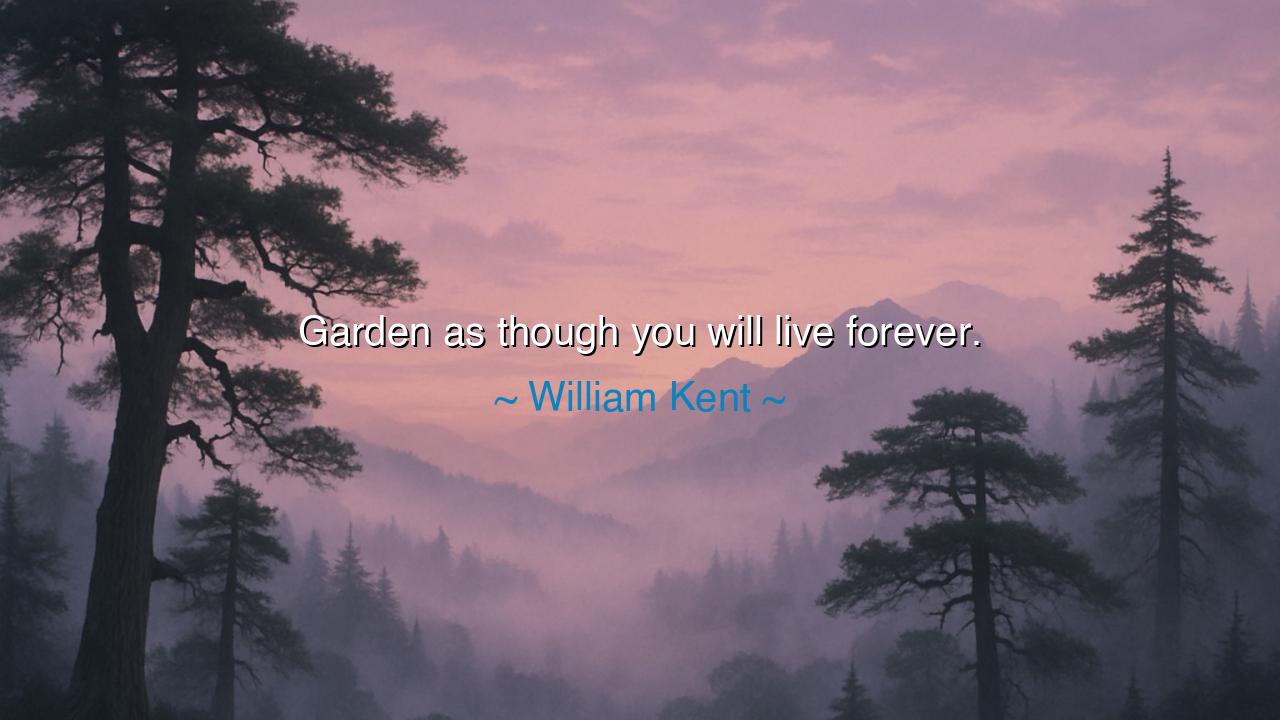
Garden as though you will live forever.






In the garden, as in life, there lies a deep wisdom hidden beneath the surface, waiting to be discovered. The words of William Kent, "Garden as though you will live forever," call us to something greater than mere cultivation of plants. They challenge us to approach our relationship with the earth, and indeed with life itself, with an understanding that transcends the fleeting moments of our mortal existence. To garden with the intent to live forever is to act as though every seed sown is a testament to endurance, hope, and the unbroken cycle of life, reaching far beyond the self and into eternity.
At the core of Kent's teaching is the concept of legacy—the understanding that every garden is not just for the present, but for the future. When one gardens with the thought of living forever, the gardener does not simply plant for tomorrow’s harvest; they plant with the knowledge that the beauty and abundance they cultivate will nourish not just themselves, but generations yet to come. The ancient Egyptians, for example, believed in the continuity of life beyond death. Their grand garden tombs were meant to honor their ancestors and to ensure that the vitality of the earth would continue for eternity. The garden itself was seen as a symbol of immortality, a place where the cycles of life, death, and rebirth could be witnessed in their most profound form.
Consider the magnificent gardens of Babylon, which stood as one of the Seven Wonders of the Ancient World. These gardens were not only an aesthetic triumph but a powerful statement of human ambition and connection to the divine. Built by King Nebuchadnezzar for his queen, these hanging gardens were designed to be a symbol of everlasting beauty and prosperity. They were not just a reflection of the present moment, but a tribute to the idea of a garden that could endure throughout the ages. In the same way, Kent’s quote teaches us to approach the earth with reverence, to plant as though our work will continue in a future that stretches beyond our own lifetimes.
Kent’s words also evoke the stoic philosophy of Marcus Aurelius, who believed that the work one does must not be concerned solely with personal gain but with the greater good of humanity. The Stoics taught that one should live as though their actions had eternal significance, striving not for fleeting pleasures but for a life lived in harmony with nature and virtue. When one gardens with the thought of living forever, they understand that their work is part of a greater cosmic order, that by cultivating the earth, they are participating in something timeless, something that will continue even when they are gone.
The lesson here is clear: when we approach our lives, our work, and our passions with the mindset of immortality, we elevate them. The act of gardening becomes not merely about cultivating beauty or sustenance for the present, but about creating something that will endure. Seeds planted today may bloom long after we are gone, leaving a mark on the world that will persist long into the future. In our gardens, we shape not only the earth but our own legacy, a testament to the love and care we gave to the world.
Take, for instance, the story of Thomas Jefferson, who viewed his garden at Monticello as more than just a place for personal pleasure. Jefferson was a visionary, planting not only vegetables and flowers but a repository of knowledge about agriculture and the natural world. He understood that the garden was a place where human effort and the forces of nature could align to create something greater. His careful attention to every plant, every variety, was a legacy that would live on, long after his death, as a source of learning and inspiration for future generations. In this, Jefferson embodied Kent’s idea of gardening as though one would live forever, seeking to create something that could endure the passage of time.
The act of gardening, then, is an act of both creation and preservation. Kent’s wisdom invites us to plant with the knowledge that we are part of something larger, something eternal. Let us cultivate our gardens, not just for ourselves, but for the world that will come after us. Tend to the earth with care, for in doing so, we are creating a legacy that will continue long after our mortal lives have passed. Garden as though you will live forever—not for your own glory, but for the glory of life itself, for the deep and abiding beauty of the earth, and for the generations that will one day walk through the paths you have planted.
In your own life, embrace this timeless wisdom. Whatever you are working on, be it a literal garden or the metaphorical garden of your relationships, your work, or your dreams, approach it with the mindset of eternity. Invest in the future with the same care and attention you would give to something that will endure. Plant with intention, nurture with patience, and leave behind a legacy that will bloom long after you have passed. Through your efforts, you will connect with something greater than yourself—a force of nature, a cycle of life, and a legacy that will live forever.






AAdministratorAdministrator
Welcome, honored guests. Please leave a comment, we will respond soon